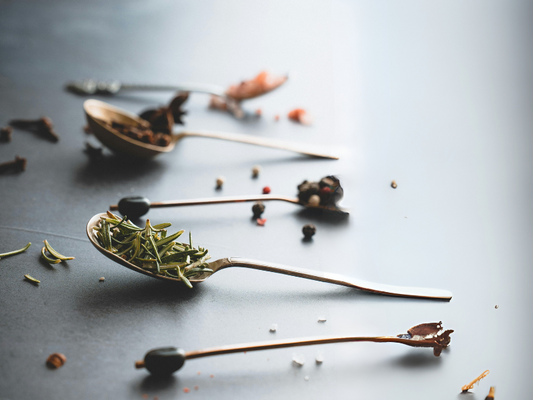
Calm & Conceive: Herbal Support for Fertility and Emotional Balance
Finding Calm in the Conception Journey
Trying to conceive is not always as simple or linear as many expect. The emotional toll of each cycle, the silent worry of "what if," and the constant pressure to do things "right" can weigh heavily. While nutrition, timing, and medical support all matter, there's another crucial layer to the story: our emotional and hormonal balance. Modern research confirms what traditional wisdom has long known—chronic stress can disrupt the very hormones that support ovulation and conception. (Source: Harvard Health)
Here’s a powerful fact: The hypothalamic-pituitary-ovarian (HPO) axis, which controls fertility hormones, is directly influenced by stress signals. That means the same part of your brain that triggers "fight or flight" also determines if your body feels safe enough to ovulate.
At MotherBees, we recognize how emotional overwhelm can impact fertility. That’s why we support this delicate journey with deeply nourishing, calming, and intuitive herbal blends that honor both body and spirit.
How Stress Affects Fertility
The Hormone Disruption Connection
The HPO axis coordinates the release of essential reproductive hormones like estrogen and progesterone. Chronic stress can disturb this system by increasing cortisol levels, which suppress gonadotropin-releasing hormone (GnRH)—ultimately impacting ovulation and the menstrual cycle. (Source: NIH Study)
Stress doesn’t only affect the timing of ovulation—it also affects egg quality and luteal phase length. Women with elevated cortisol levels may see shorter luteal phases, which can make it difficult for implantation to occur. Furthermore, stress-induced inflammation can negatively impact cervical mucus quality, making it harder for sperm to reach the egg.
An additional concern is how stress affects libido and intimacy. When cortisol is high, libido often drops, and sexual experiences can become goal-oriented and stressful rather than bonding and nourishing. This emotional disconnect can further compound the challenges of trying to conceive.
Practical Tips
1. Begin a daily relaxation practice: 10 minutes of breath work or meditation helps lower cortisol.
2. Use a fertility tracking app not just for ovulation, but to note mood and energy patterns.
3. Incorporate Fertile Ground Herbal Tincture to support your endocrine system gently and daily.
4. Try yoga poses like legs-up-the-wall and child’s pose to promote circulation and stress relief.
5. Set boundaries on social media or fertility forums that may increase anxiety.
Understanding the relationship between stress and fertility empowers you to make intentional shifts. By creating a calm inner environment, you’re not only soothing your nervous system but also nurturing the hormonal harmony essential for conception.
Nervine Herbs to Calm the Mind and Body
Nervines are herbs that support the nervous system by calming tension, easing anxiety, and improving sleep. Lemon balm, passionflower, and chamomile are especially soothing for those dealing with fertility-related anxiety. Lemon balm (Melissa officinalis) has been shown to reduce cortisol levels and promote a sense of peace. (Source: PubMed Study)
Passionflower works to balance GABA in the brain, promoting sleep and decreasing anxious thoughts. Chamomile is a time-tested herbal relaxant that reduces inflammation and supports digestive health—an added bonus for fertility.
Other beneficial nervines include skullcap and oatstraw. Skullcap calms frazzled nerves and supports a sense of safety. Oatstraw nourishes the nervous system with B vitamins and minerals, helping restore depleted energy reserves that stress often drains. These herbs are safe for daily use and can be used throughout the cycle.
Using nervines regularly can help reset the nervous system’s baseline, training the body to move from “fight or flight” into “rest and digest.” This state is essential for reproductive function and emotional resilience.
Try this at home
1. Brew a nightly calming infusion with Blissful Mama Tea, rich in nervine herbs.
2. Practice a sensory grounding ritual: light a candle, journal with a warm tea in hand, and use calming affirmations.
3. Try a warm foot soak with chamomile tea bags to signal your nervous system it’s time to rest.
4. Create a "quiet hour" each evening to unplug and prepare the body for sleep.
5. Use an herbal eye pillow infused with lavender or chamomile during naps or meditations.
Nervine herbs are gentle yet powerful companions on the conception journey. When used consistently, they help soften the inner landscape, offering your body the rest and recovery it needs to welcome new life.
Adaptogens for Hormonal Balance and Resilience
Adaptogens are a class of herbs that help the body respond to stress and restore systemic balance. Unlike stimulants, which can force energy, adaptogens work by supporting the adrenal glands, which are central to hormonal communication. When the adrenals are overworked, they often prioritize stress hormone production over reproductive hormones.
Ashwagandha, shatavari, and rhodiola are three powerful adaptogens with unique benefits for fertility. Ashwagandha has been shown to reduce cortisol levels, support thyroid function, and improve resilience under stress. Shatavari acts as a female reproductive tonic, supporting estrogen levels and moistening dry tissues. Rhodiola helps combat fatigue and enhances emotional stability—especially useful for women undergoing fertility treatments. (Source: PubMed Study)
Incorporating adaptogens into your routine doesn’t require a complicated regimen. You can rotate them depending on your cycle phase or emotional needs. For example, use ashwagandha in the luteal phase when your body may be more fatigued, and rhodiola during the follicular phase to support energy and mental clarity.
Tips
1. Add powdered ashwagandha to your warm milk or porridge before bed.
2. Take Mood Bloom during emotionally charged phases or after a challenging cycle.
3. Try Take the Edge Off in your morning tea for calm focus.
4. Consider a 5:2 adaptogen schedule: five days on, two days off to give your system a break.
5. Journal your emotional and physical responses to adaptogens to find your best match.
Adaptogens bring steady, subtle support to your hormonal system, helping your body prioritize fertility over stress. With consistency and care, these herbal allies can shift you from survival mode to a state of thriving.
Womb and Cycle Support
Uterine Tonics and Blood Nourishers
Womb health and cycle regularity are foundational for conception. Uterine tonics such as red raspberry leaf and blood-nourishing herbs like nettle and dong quai offer vital support to the reproductive system. These herbs don’t just address symptoms—they help the womb become a receptive, well-nourished space for life.
Red raspberry leaf strengthens uterine muscle tone and may reduce cramping during menstruation. Nettle is deeply nutritive, providing minerals like iron, magnesium, and calcium to replenish the body after each cycle. Dong quai, known as the “female ginseng,” improves blood flow to the pelvic area and is often used in Traditional Chinese Medicine to harmonize menstrual cycles. (Source: Healthline)
These herbs are especially helpful for women with irregular or painful cycles, signs of blood deficiency (such as fatigue or pale skin), or those recovering from hormonal birth control. They support not just cycle tracking but full cycle health—from menstruation to ovulation and back.
Ways to Support Your Womb
1. Drink Womb Wellness Tea daily during your follicular and luteal phases.
2. Add Fertilitea Hormone Balancing Tea for overall hormonal regulation.
3. Use warm castor oil packs on the lower abdomen 2–3 times per week.
4. Eat iron-rich foods like blackstrap molasses, lentils, and dark leafy greens.
5. Create a weekly womb massage routine using herbal-infused oils.
When you support your womb and blood with loving consistency, you create a more fertile internal landscape. These herbs serve as nourishment—not just for the body, but for the deeper wisdom of your reproductive system.
Creating a Fertility-Calm Herbal Ritual
Herbal rituals offer more than just routine—they provide comfort, structure, and connection to your body. When trying to conceive, creating intentional practices can help you shift your nervous system into a parasympathetic, receptive state. These rituals become the emotional backbone of your fertility journey, helping you reclaim moments of peace and presence.
A fertility-calm herbal ritual can be as simple as brewing a cup of tea each morning or soaking in a healing bath each weekend. Over time, the repetition of these rituals fosters trust between your body and mind. They serve as daily love letters to your womb—an invitation to feel safe, supported, and seen.
The beauty of herbal rituals is how they combine practicality with ceremony. Lighting a candle, sipping Detox Tea: Herbal Blend to Support Pre-Conception, or adding Joy Tonic to sparkling water can all be sacred moments. Incorporating affirmations, gratitude journaling, and warm herbal compresses makes these rituals deeply grounding.
Actionable Steps
1. Designate a time each day for your herbal moment (morning, bedtime, or moonrise).
2. Use Postpartum Herb Bath or Yoni Steam Herbs for Miscarriage as a monthly womb-clearing ritual, even if not postpartum.
3. Pair your tea with journaling prompts like “What does my womb need today?” or “What am I ready to receive?”
4. Diffuse calming essential oils like lavender or clary sage while preparing your herbal blends.
5. Track how you feel emotionally and physically after each ritual to build intuitive awareness.
The small acts of care and consistency in your herbal rituals become a sanctuary of calm. In this space, your body learns it’s safe to soften—and in that softening, fertility often finds its way.
Foods as Herbal Medicine
What to Eat for Fertility & Calm
Herbs are powerful allies, but when paired with nourishing food, their effects multiply. Fertility-friendly foods infused with calming and hormone-balancing herbs can support your body on every level—digestive, emotional, and endocrine. Food is the most accessible and consistent form of medicine.
Broths infused with nettle or raspberry leaf deliver minerals directly to the bloodstream. Warm porridges made with spices like cinnamon, cardamom, and ginger support digestion, circulation, and metabolism. Eating in rhythm with your cycle—lighter meals during menstruation and warming, grounding meals in the luteal phase—also helps regulate hormonal shifts.
MotherBees pantry staples such as Liver Cleanse Herbal Tea, After Dinner Mint, or Healthy Liver Bitters support detox pathways, while Calm Tummy Bitters soothe the gut—essential for absorbing fertility nutrients. Pairing herbal teas like Organic Raspberry Leaf or Soursop Leaf Tea Supplement with meals keeps hydration and calm a consistent focus.
Tips & Hacks
1. Simmer nettle or raspberry leaf in bone broth and use as a base for soups.
2. Add cinnamon and turmeric to your fertility breakfast bowl.
3. Sip Blissful Mama Tea or Sleep Support Bundle blends with dinner to aid digestion and nervous system rest.
4. Add a pinch of dried shatavari root to smoothies.
5. Enjoy herbal-infused ghee or oils over roasted root vegetables.
When herbal support is woven into your meals, it becomes an everyday source of healing. These simple, nurturing foods remind your body that fertility is not about pressure—it’s about nourishment.
Syncing with the Moon and Menstrual Phases Using Herbs
Your menstrual cycle mirrors the phases of the moon—both spanning roughly 28–30 days. Syncing your herbal support with both can help you find greater alignment and flow with your body. Just like the moon, your body has phases of building, peaking, releasing, and resting.
The follicular phase (Day 1–14) corresponds with the waxing moon and is the time for energy-building herbs like rhodiola, green tea, and nettle. Ovulation (around Day 14) reflects the full moon—consider cooling and balancing herbs like hibiscus and rose. The luteal phase (Day 15–28) aligns with the waning moon and benefits from calming herbs like ashwagandha, chamomile, and lemon balm. Menstruation aligns with the new moon, a time for gentle cleansing and rest.
Herbs like Menstrual Melody Tea can ease luteal symptoms, while Sleep Support Bundle can regulate sleep during hormonal shifts. You can also track your cycle with moon journals, noting emotional and physical patterns to inform your herbal choices each month.
Practical Cycle Syncing
Follicular: Drink Detox Tea and add nettle to smoothies.
Ovulation: Use cooling teas like rose, mint, and rooibos.
Luteal: Add Joy Tonic or Mood Bloom for mood balance.
Menstruation: Take warm baths with Herbal Cesarean Spray or use Everyday Baby Balm for comfort.
Moon Ritual: Place herbs under moonlight to energetically charge your blends.
Syncing with your cycle and the moon fosters a sense of harmony. When you align herbal support with nature’s rhythm, your fertility path becomes more intuitive, more empowered—and deeply yours.
When to Seek Deeper Help
Combining Herbs with Medical Support
Herbs are powerful, but they’re not meant to replace medical care when needed. If you’ve been trying to conceive for a year (or 6 months if over 35), it’s wise to consult a reproductive endocrinologist. The good news is that herbal support can complement medical treatments beautifully.
Herbs can ease side effects of fertility medications, reduce emotional stress during IVF, and support detoxification between cycles. For example, Echinacea Complex Herbal Tincture can help protect immunity during hormone treatments. Immune Support Bundle can be helpful post-procedure.
Working with an integrative practitioner or herbalist ensures your blends don’t interfere with medications. They can guide timing, dosage, and herb safety—especially when dealing with autoimmune conditions, PCOS, or endometriosis.
Signs to Seek Medical Help
1. No cycle or irregular cycles for over 6 months
2. History of miscarriages or known reproductive conditions
3. Hormone levels outside optimal ranges (FSH, LH, AMH, TSH)
4. Partner’s sperm analysis showing low motility or morphology
5. Undergoing IUI, IVF, or egg freezing
Seeking medical support doesn’t mean giving up on holistic care. When you combine science with nature’s medicine, you create a multidimensional path to fertility—one that’s both proactive and deeply nurturing.
Planting Seeds of Calm
The journey to conception is sacred and sensitive. It's a time of growth, uncertainty, and immense hope. Herbal support doesn’t offer quick fixes—but it does offer steady companionship, calming the mind and nourishing the womb.
At MotherBees, we believe in the power of intuitive healing. Through teas, tinctures, rituals, and food, you can reclaim a sense of calm and connection—both to yourself and your fertility journey. May this guide serve as a gentle reminder that your body is wise, your path is unfolding, and healing is always possible.
Let calm be your foundation—and conception will follow in its own perfect rhythm.











